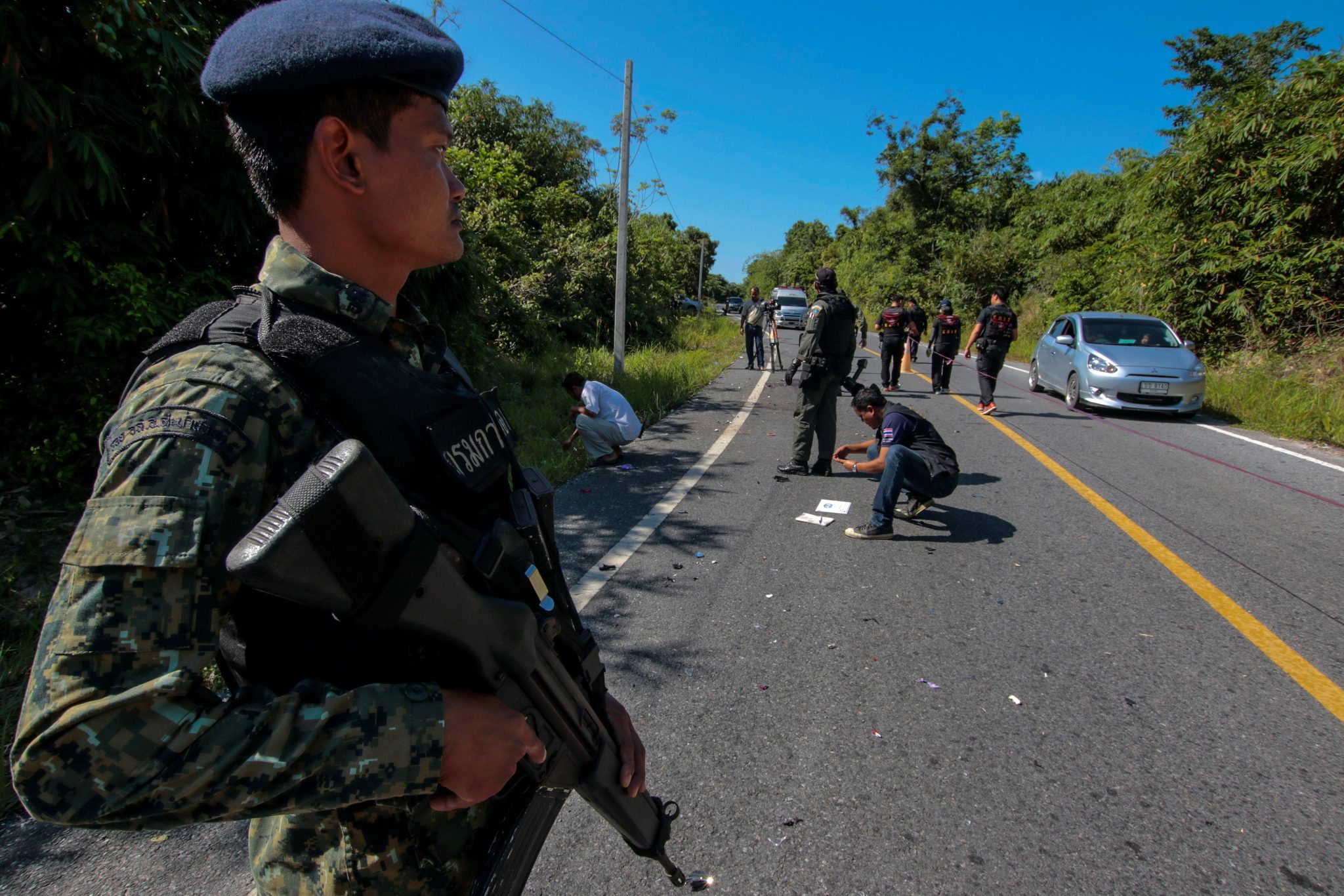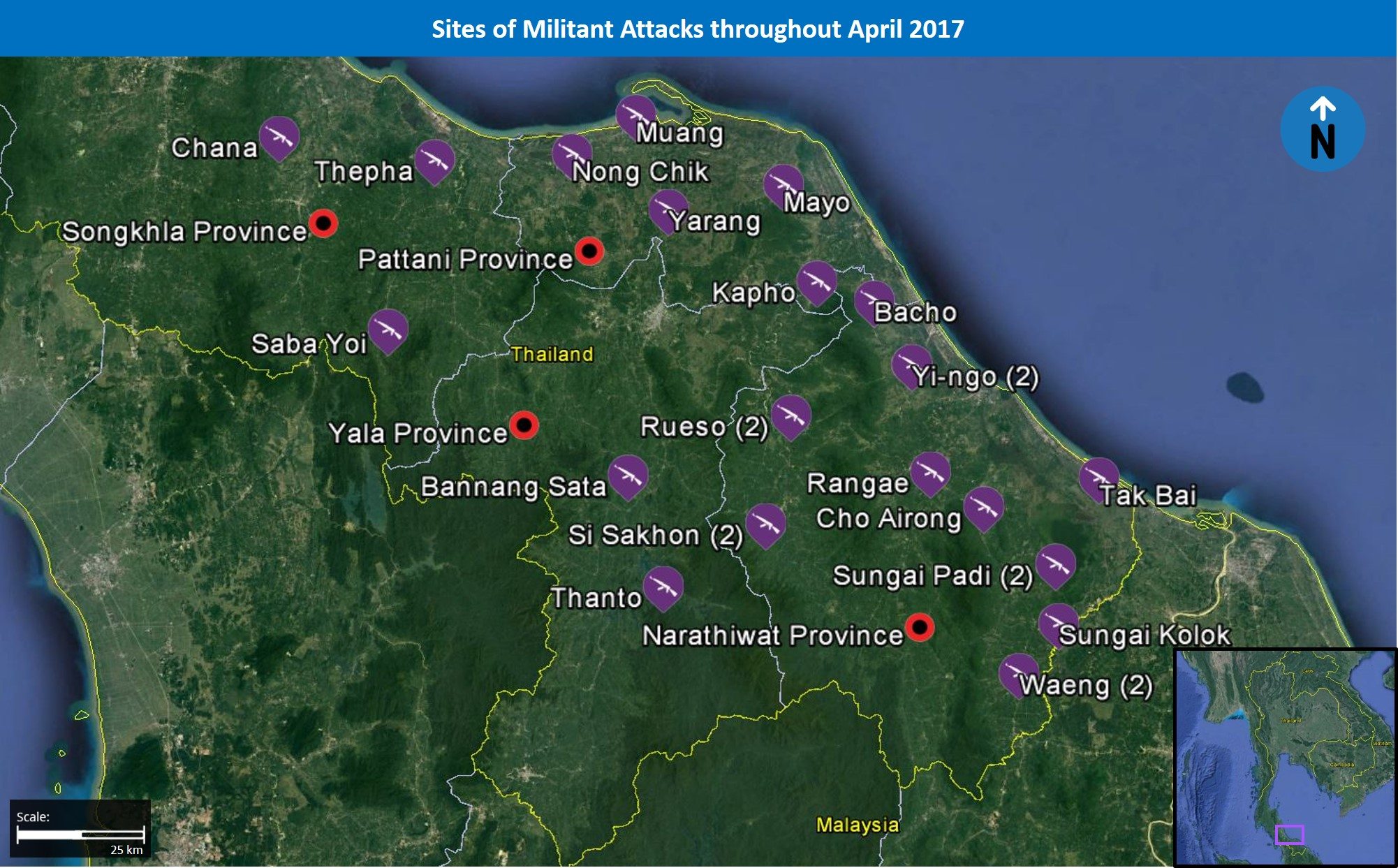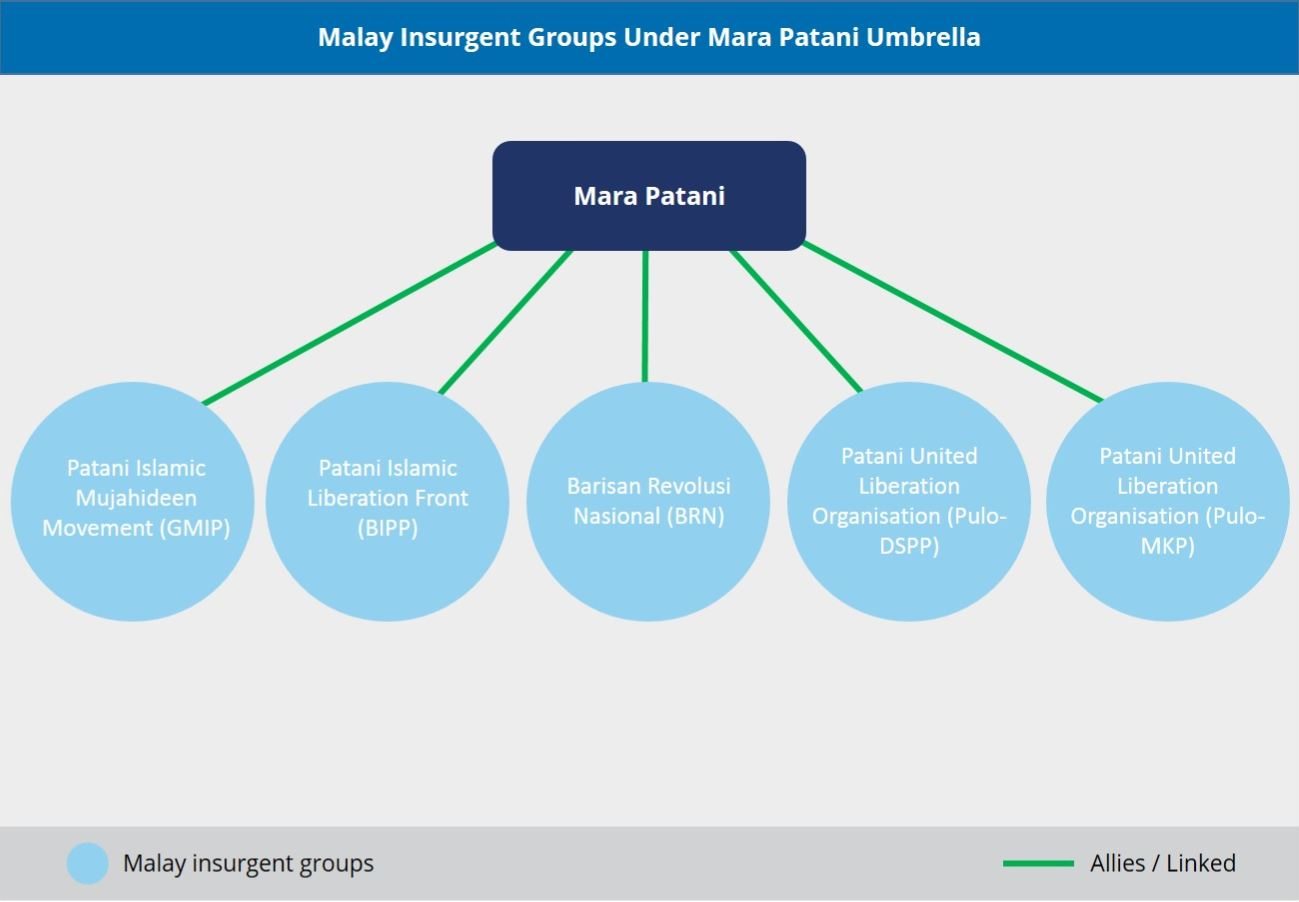Current Situation: Thailand Attacks
On April 19, security forces and non-governmental installations were targeted in 13 locations spread between Narathiwat, Pattani, and Songklha in a series of simultaneous attacks that began at approximately 19:00 (local time). In Narathiwat, grenades were thrown at a checkpoint in Yi-ngo, a patrol in Si Sakhon, in a residential area of Waeng, and at a special forces unit in Rangae; shooting attacks were launched against a military base in Tak Bai and a defense volunteers’ group in Sungai Padi; and a bomb reportedly went off in Rueso. In Pattani, grenade attacks were recorded against police stations in Kapho and Sarong, as well as against a checkpoint in Mayo. Finally, in Songkhla, a grenade was thrown at a police station in Chana, two bombs went off near a base in Saba Yoi, and another volunteer group was ambushed in Thapha. As of the time of writing, two individuals have been reported dead as a result of the attacks, while another three were injured.
Previously, during the overnight hours between April 6 and 7, a wave of attacks targeted 19 districts across Narathiwat, Pattani, Songklha and Yala, which included IEDs, attacks on power transformers, incidents of arson and small arms fire. This also includes three locations targeted on April 19, namely Yi-ngo, Si Sakhont, Waeng, and Sungai Padi. Officials also recovered several explosive devices used in the attacks that had not detonated, and some of the targeted electricity pylons were reportedly still functioning after the attacks. This followed the ratifying of a new army-backed constitution by the King on April 6.
Between August 11-12, 2016, a series of coordinated IED attacks in popular tourist areas in Hua Hin, Phuket, Surat Thani, and Takua Pa killed 4 and injured 36. While the group does not traditionally claim attacks, the Malay separatist group Barisan Revolusi Nasional (BRN) has been implicated in the August 2016 attacks. A BRN spokesman claimed in an interview published on April 10 that they only operate in the restive southern states, although “in certain situations and certain contexts it is not impossible for BRN to act outside the designated area”.
The BRN is part of Mara Patani, an umbrella group traditionally comprising representatives of five liberation groups, including the BRN, Patani Islamic Liberation Front (BIPP), Patani Islamic Mujahideen Movement (GMIP) and two factions of Patani United Liberation Organization (Pulo-DSPP and Pulo-MKP).
On February 22, an unaffiliated separatist group struck a deal with the Thai government over establishing “safe zones” in the southern provinces, although on April 10 the BRN formally released a statement that they rejected any ongoing negotiations or deals. In the interim period, at least two unclaimed attacks against security forces occurred on March 30 and April 3 in Pattani and Narathiwat.
Assessments & Forecast
Wave of attacks likely carried out by BRN in attempt to increase political standing, bargaining position in event of future peace deals
The recent spate of attacks, on April 19 and in the weeks prior, has taken place amidst a significant political change in the country. As Thailand appears to be in a notable stage of political flux since the 2014 coup, which brought in the military government who have been in power since, it is likely that the Thai insurgent groups, specifically the BRN, are attempting to carry out the attacks to solidify their stance in any future polity. As this political flux carries with it two elements of both the new constitution and the upcoming peace talks, so too can be understood the two roles that the recent attacks play.
Firstly, Thailand’s new constitution stands as arguably one of the most significant legal changes to the country’s makeup since the establishment of the constitutional monarchy in 1932, given its implementation of a military-controlled senate and provisions downgrading the scope of the executive branch. Around this change, the Malay insurgents are likely looking to express their symbolic disapproval to the military’s consolidation of power in the country, but also to attempt to make sure that they are still perceived as relevant in both the eyes of the government and the eyes of the public. As the Thai government moves forward in remodeling the country’s governing institutions in its own image, the BRN is eager to remind the junta that neither the insurgent’s organization nor cause should be brushed aside in this new wave of governance.
Secondly, as the BRN have expressed opposition to the aforementioned peace talks, it is probable that they wish to carry out acts of militancy to display their relevance to the region, in order to cast a shadow on any advancements in negotiations. This assessment is underscored by the fact that all of the attacks took place in the restive Deep South, while previous high-profile attacks aimed at capturing attention during politically sensitive periods have also been carried out in more northern areas, indicating a particular focus on projecting power in the south. It remains unknown, however, whether they seek to totally derail the peace talks by undermining their purpose, demonstrating that any kind of peace deal without the BRN would be redundant, or if they are hoping to gain leverage with the anticipation of future participation.
Recent increase in scope of militancy throughout April suggests personnel changes in BRN, including possible new leadership
The uptick in activity from the BRN, while not unheard of for the group, does appear to suggest not only a change in tactics but also an increase in the scope of their capabilities, particularly regarding their ability to carry out numerous attacks, in various locations over a short span of time. One possible explanation is that this is the result of a major recruitment drive by the group, who are able to take advantage of the large number of poor and young men in the regions, which still constitute some of the lowest areas of economic development in the country. Such an assessment is supported by comments from the Thai Defense Minister, who also blamed the unrest on April 6-7 on a ‘new generation’ of fighters working with the group. We assess that the group has brought a number of new recruits into their ranks, likely in line with their new strategy of increasing visibility, as mentioned previously. Further supporting this assessment is the lack of militant capability abilities and weapons expertise within the group, leading to such a low casualty account, despite so many different instances of militant attack.
Additionally, media speculation has emerged across the country that a new militant hardliner by the name of Abdullah Wan Mat Noor has been named the new chairperson of the BRN’s leadership council, known as Dewan Pimpinan Parti (DPP). Although these claims have been denied by the BRN’s public relations representatives, who have a historical tendency for extreme secrecy and misinformation, a change at the top of the group’s leadership would account for the change in tactics, as well as indicate further incidents to continue in kind.
Finally, it may be possible that these recent events, as well as the possible recruitment which would have been necessary to facilitate them, may come from a push by the BRN to consolidate members of other Mara Patani factions, in an attempt to bring together the militant groups. This would further account for the geographical scope of the operations.
Further violent incidents, spates of attacks likely going forward, increasing potential of strong military reaction
FORECAST: With all this in mind, we assess that further attacks will take place in the coming weeks, and while the majority are likely to occur in the country’s south for reasons already mentioned, the possibility of militant acts occurring in more northern areas cannot be ruled out, especially if the political situation or insurgent violence becomes dramatically exacerbated.
Moreover, as the government pushes to project stability in this time of political change, a counter-insurgency push remains likely, which will then, in turn, likely catalyze the unrest. Nonetheless, we assess that given the capabilities of the Malay insurgents, the chance of a sophisticated high-impact attack in any area of Thailand in the immediate future is questionable. Further, the risk of militant attack in Bangkok remains unchanged as of the time of writing, despite the uptick in southern violence.
Recommendations
Travel to Bangkok may continue while adhering to standard security precautions regarding the latent risk of crime and militant attacks. Maintain vigilance throughout Bangkok and nationwide, given the threat of attacks relating to the country’s political situation and general militancy. We advise against nonessential travel to the provinces of Pattani, Yala, Narathiwat, and Songkhla at the border with Malaysia, due to a persistent threat of militancy and ongoing counterinsurgency operations. Avoid the immediate vicinity of any protest and political gatherings due to the potential for unrest and violence to be recorded during these events. Avoid discussing the current political situation in Thailand in public. Be advised that criticizing the military and the monarchy is illegal and may lead to arrests.


